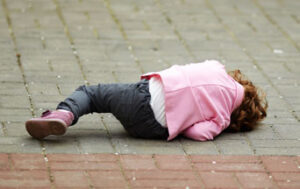
There have always been parents who spare the rod and spoil the child. However, today’s hyper-protective parents have thrown away the rod of any punishment and taken the coddling of children to dangerous new levels.
The Spanish daily El Mundo carried an article on the disastrous effects of this upbringing on children. The author, Berta G. De Vega, shows how children are beyond spoiled. They don’t want to do anything. They may be soft and cuddly, but they are irresolute and display no character.
Red flags need to go up when children refuse to perform basic functions. Eva Millet, the author of Hiperpaternidad, claims there are already children who do not get up when they fall. They lay in wait until an ever-attentive hand pulls them up.
Hyper-pampered Children and Hyper-pampering Parents
Hyper-pampered children do not appear out of anywhere. They are a product of clueless, hyper-pampering parents, who confuse affection with preventing all suffering. Many parents were products of broken homes and pamper their children so that they will not suffer as they did.
Teachers are shocked when they see parents carrying their children’s backpacks to the school door. Other parents will do their children’s homework to save them from the effort and the possibility of failure.
Help Remove Jesus Bath Mat on Amazon
The helicopter parent now seems to resort to drones to monitor the smallest acts of their children’s lives. They will contest test results or fight with referees during games. They are willing to suffer everything so that their children do not suffer.
The Three Great Untruths
This upbringing results from a pedagogy that favors fantasy and emotion over the role of logic and the formation of the will. These mistaken ideas have become embedded in education and culture.
The book, The Coddling of the American Mind: How Good Intentions and Bad Ideas Are Setting Up a Generation for Failure, explains Generation Z and how its children are on the road to disaster.
Authors Jonathan Haidt and Greg Lukianoff claim that present generations have learned three “Great Untruths” from parents, teachers and society. These untruths are “you are fragile,” “trust your feelings,” and “life is a battle between good and bad people.” To summarize the three, bad people make others feel unsafe and fragile.
The result is what Haidt and Lukianoff denounce as the “fetishization of safety” and the suppression of all suffering, even discomfort.
Satanic Christ Porn-blasphemy at Walmart — Sign Petition
Far from making children feel safe and secure, it harms children emotionally and mentally. It leads to an alarming rise in youth suicide rates, stress and depression.
Schools Where No One Is Wrong
The education establishment must also share in the blame for the pampering. Too many classroom experimental programs promote egalitarian results where everyone gets a prize. Others teach relativism, that there is no single right answer. Honors and achievement awards are discouraged. Defects are de-personalized and blamed on oppressive social structures.
Social agendas have an uncanny way of finding their way into classrooms. The latest craze is to find systemic racism in every subject, even mathematics. The result is never better learning but less effort and the further application of the three Great Untruths.
Character 101
The El Mundo article notes that school systems everywhere are alarmed by this squishy generation that is unsure of itself and unable to confront reality. Some are proposing “character education” as a solution.
Yet, it is a typical bureaucratic solution to a moral problem. It does not consider that these concerned educators have to fight an entrenched system that has long discouraged character. Schools that instill in students some sense of discipline and work ethic are usually attacked by liberal media for being too rigid and oppressive.
How Panera’s Socialist Bread Ruined Company
In the relativistic wasteland of postmodern education, everyone is afraid to affirm any values as definitive and absolute. If character education is introduced, some values will have to be defined. There will necessarily be losers and those winners so hated by progressive educators. Character education will probably end up being one more feel-good program that favors a liberal agenda.
The Need for Strong Families
Character cannot be taught like mathematics or geometry. It involves being courageous when acting in doing what is right and avoiding what is wrong. It presupposes values that must be taught early in life, especially inside the family. Youth also need role models inside the family and community to transmit these values and make them accessible and understandable.
The real way to overcome hyper-pampered children is the formation of strong (and big) families. Children have no character today because so many families are broken and can give them no support. The bonds of community are so shattered that children see that character is no longer valued.
The Need for a Moral Institution
However, one of the most important institutions for the formation of character is the Church. Since character deals with an attitude in the face of right and wrong, it requires an institution that can define the morality of human acts. The best way to instill character is through the Church that teaches and defends a moral law and provides the sacraments and other channels of grace that strengthen people in their resolve to obey this God-given law.
The Church also provides the faithful with the highest motivation to develop character since it is a manifestation of one’s love of God. With God, all is possible.
Indeed, the crisis of hyper-pampered children will not be solved until there is a reordering of principles oriented toward their development and sanctification. Without God, the community and family, the child is left helpless on the floor, without the means or will to get up.
© Adobe Stock/Aliaksei Lasevich


